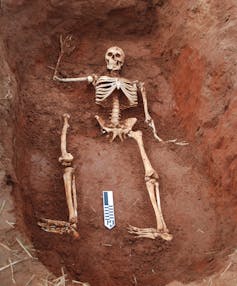UN chief calls Antarctica 'sleeping giant... being awoken by climate chaos'
United Nations Secretary-General António Guterres on Monday issued yet another impassioned call for ambitious climate action after a trip to Antarctica and amid preparations for the U.N. Climate Change Conference later this week.
"I have just returned from Antarctica—the sleeping giant. A giant being awoken by climate chaos. Together, Antarctica and Greenland are melting well over three times faster than they were in the early 1990s," he told reporters in New York City.
"It is profoundly shocking to stand on the ice of Antarctica and hear directly from scientists how fast the ice is disappearing," the U.N. leader said of his trip to the continent last week, pointing out that "this year, Antarctic sea ice hit an all-time low."
"Leaders must not let the hopes of people around the world for a sustainable planet melt away."
Scientists project that 2023 will be the hottest year in 125,000 years. Recent research has also shown that Antarctica is warming faster than widely cited models predicted, and even if humanity significantly cuts planet-heating pollution from fossil fuels, the West Antarctic Ice Sheet faces an "unavoidable" increase in melting this century.
Guterres stressed Monday that "what happens in Antarctica doesn't stay in Antarctica. We live in an interconnected world. Melting sea ice means rising seas. And that directly endangers lives and livelihoods in coastal communities across the globe. Floods and saltwater intrusion imperil crops and drinking water—threatening food and water security."
"The movement of waters around Antarctica distributes heat, nutrients, and carbon around the world, helping to regulate our climate and regional weather patterns," he explained. "But that system is slowing as the Southern Ocean grows warmer and less dense. Further slowdown—or entire breakdown—would spell catastrophe."
"The cause of all this destruction is clear: the fossil fuel pollution coating the Earth and heating the planet," he stressed. "Without changing course, we're heading towards a calamitous 3°C temperature rise by the end of the century."
That's according to a U.N. analysis of currently implemented policies, released last week ahead of the COP28 summit—which will be hosted in the United Arab Emirates by Abu Dhabi National Oil Company CEO Sultan Al Jaber, who has allegedly used meetings about the upcoming climate talks to push for fossil fuel deals with other governments.
"If we continue as we are, and I strongly hope we will not, the Greenland and West Antarctica ice sheets will cross a deadly tipping point. This alone would ultimately push up sea levels by around 10 meters. We are trapped in a deadly cycle," Guterres declared Monday. "At COP28, which starts later this week, leaders must break this cycle."
"Leaders must act to limit global temperature rise to 1.5°C, protect people from climate chaos, and end the fossil fuel age," the U.N. chief said, referencing a key goal of the 2015 Paris agreement. He called for tripling renewables, doubling energy efficiency, bringing clean power to all, a "clear and credible commitment" to phasing out fossil fuels, and "climate justice."
"Antarctica is crying out for action," Guterres said. "Leaders must not let the hopes of people around the world for a sustainable planet melt away. They must make COP28 count."






